Free-roaming chickens can often be spotted scratching in the garden and plucking pesky bugs off our farm produce. We have five different types of chicken here at Babylonstoren – Boschvelders and Potch Koekoeks in the garden, as well as the Leghorns, Araucanas and Lohmann Browns that are looked after by farmer Christo. We collect their eggs daily to be served at Babel and the Greenhouse, and there’s always a fresh supply available to purchase at the Farm Shop. They never fail to charm our guests and make up a hard-working part of our farming staff.
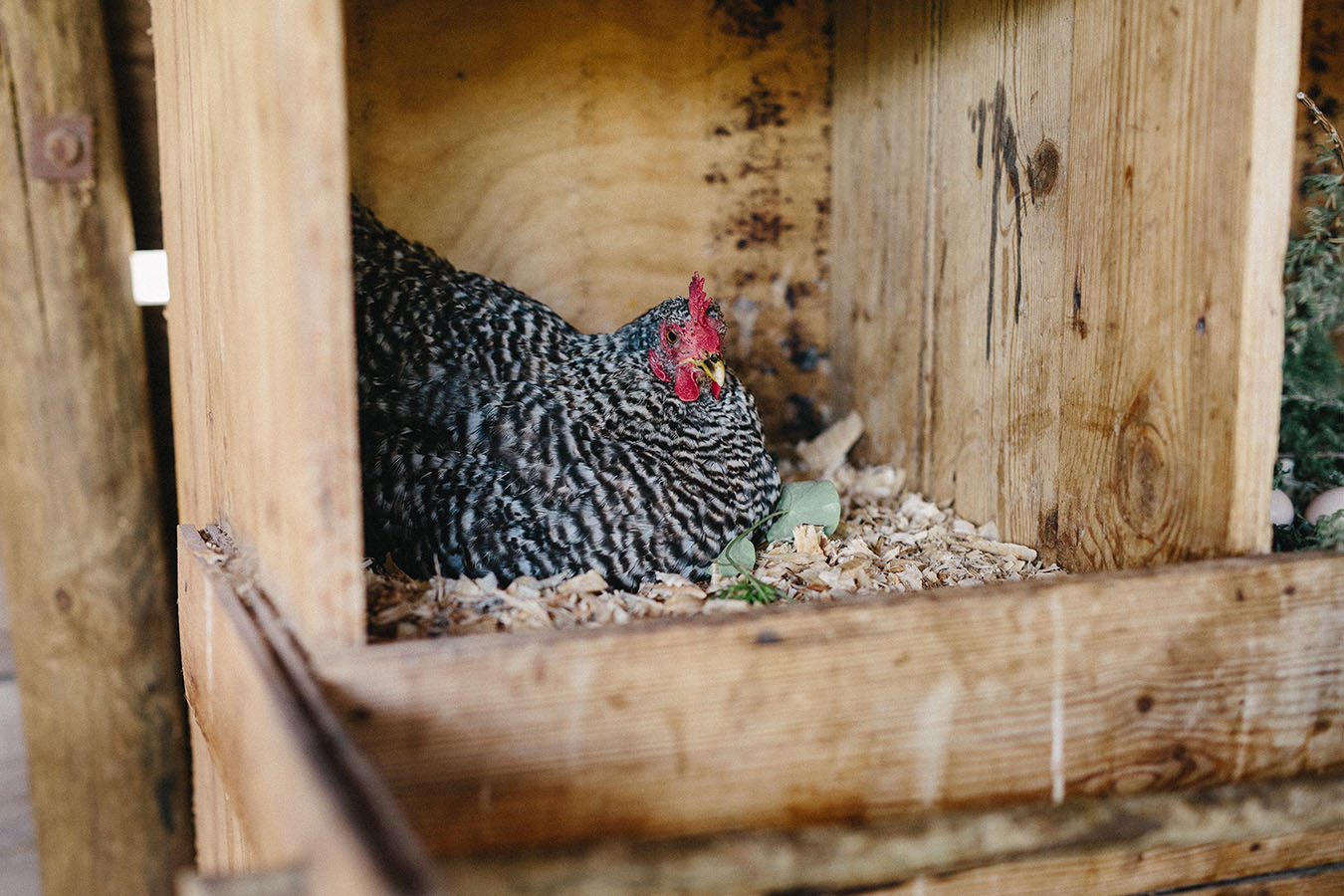
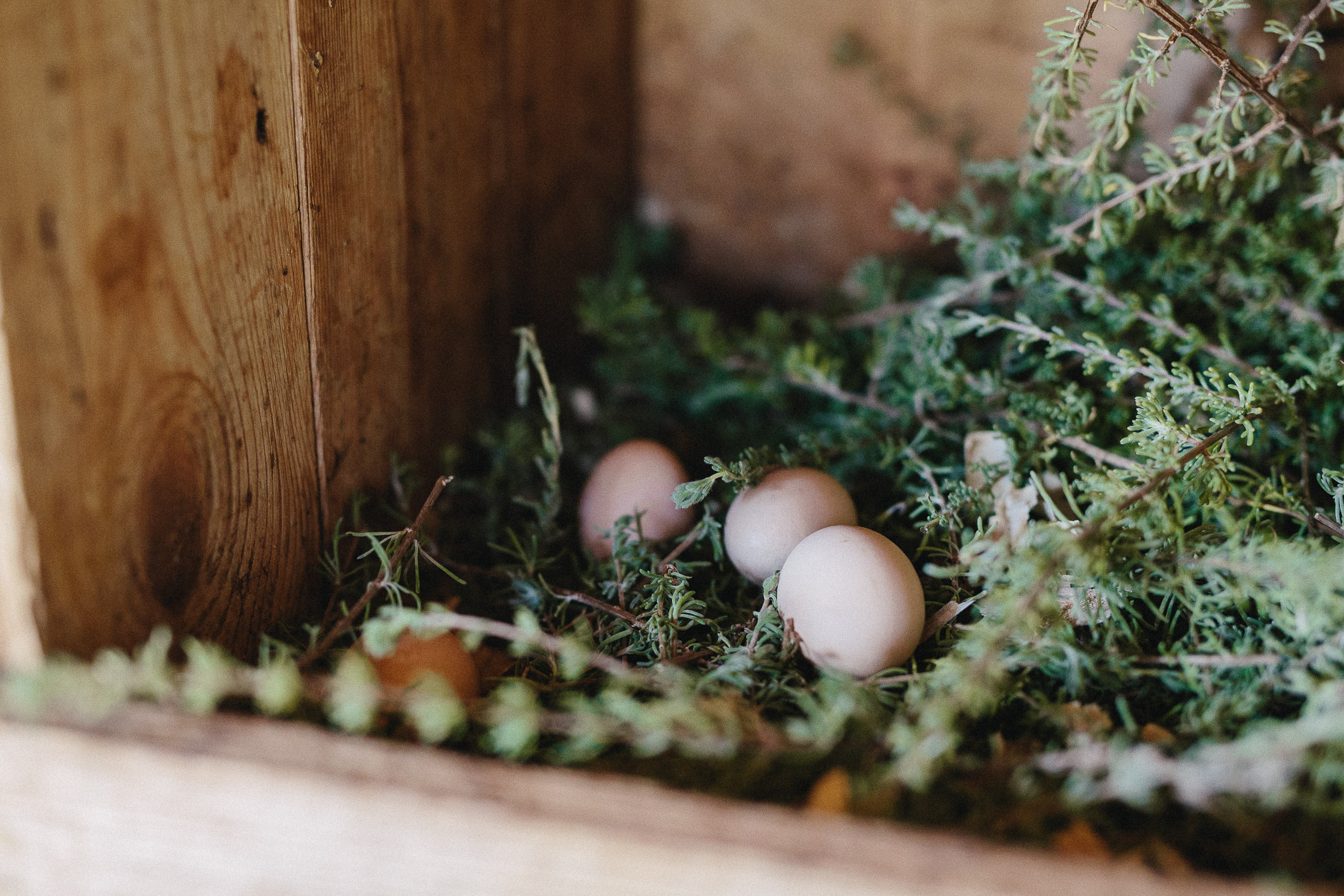
Chickens are very easy to keep and play a host of helpful roles in the garden and kitchen: they’re fantastic at ridding your garden of insects and snails, and a small brood of about six chickens can lay enough eggs to feed a family of four to six people. Apart from their usefulness, there is something intrinsically therapeutic about keeping chickens – their determined busyness and gentle companionship make them perfect family pets in even smaller-sized gardens. Chicks take about six months to mature into laying hens, after which they will provide you with a steady supply of eggs and delightful company in the garden.
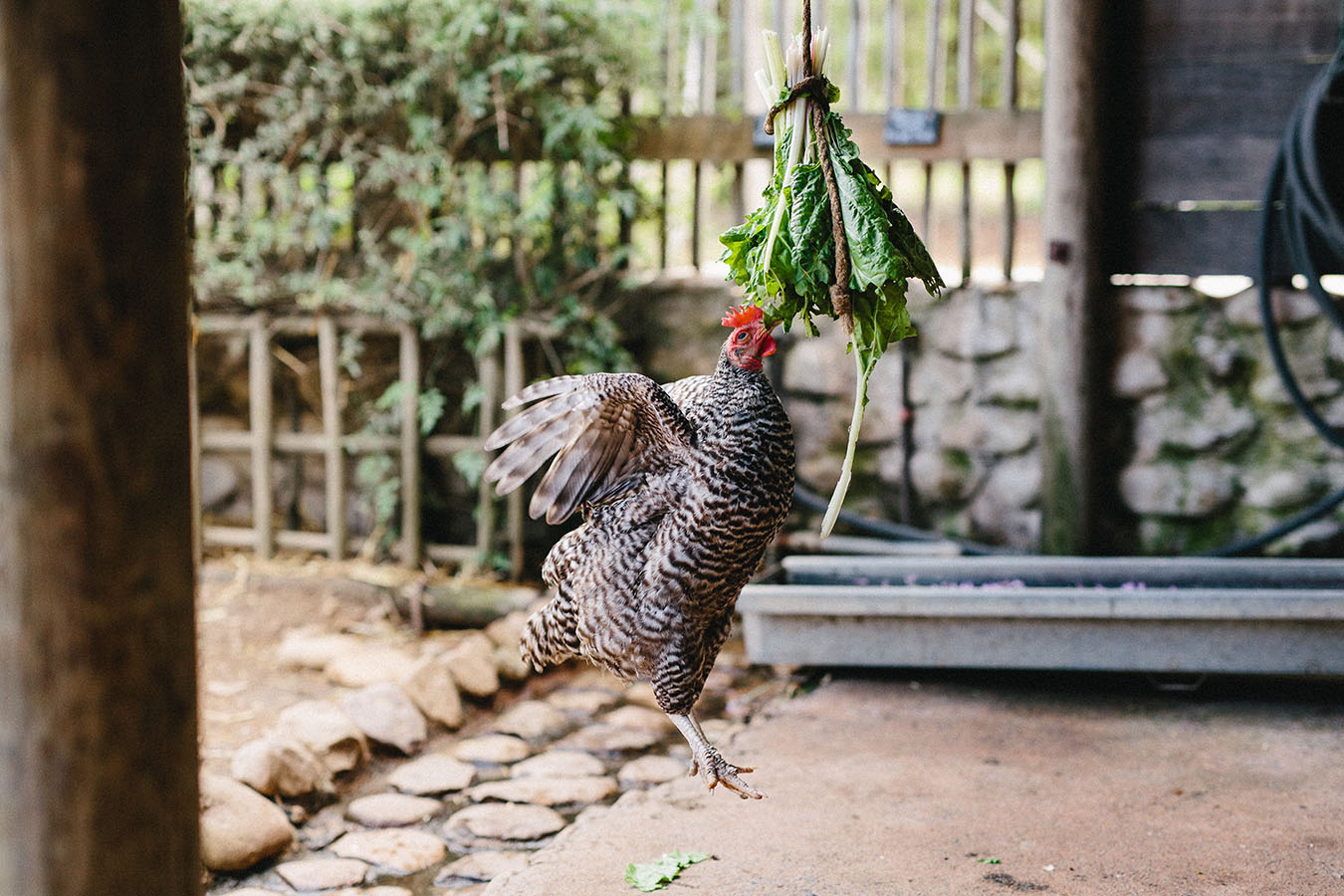
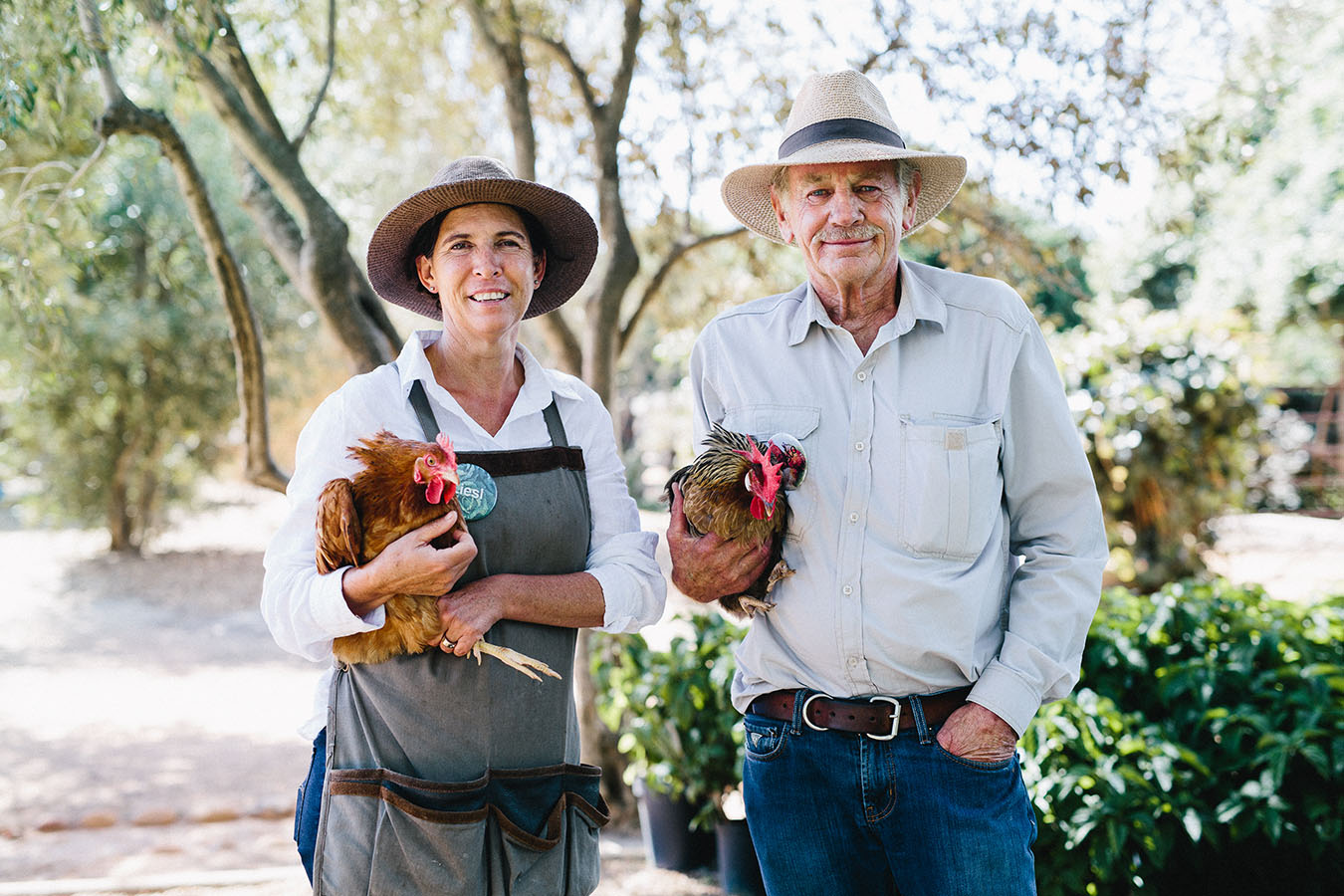
Tips for keeping chickens at home
- All a chicken needs in the garden is a safe, covered shelter at night to sleep and space to scratch and explore during the day. Calculate 20 cm space per hen in the chicken house for comfortable settling down at night.
- Provide the chickens with a perch about 60 cm high – not too tall, as they are prone to injure their feet jumping down. Let them out early in the morning for their first insect run.
- The chicken house must be airy and dry to avoid disease, and a few shady spots are crucial for summer.
- Cover the floor of their home with straw and clear the manure out daily when you collect the eggs. Soiled straw from the coop makes a fantastic mulch and fertilizer in the garden.
- Happy hens require a clean supply of water and to be fed once a day with a good brand of chicken food or offcuts from your kitchen. Chickens can eat almost any cooked or raw veggie scraps, except onions. Avoid laying out cooked meat to feed them, as this can lure rats. Be careful not to over-indulge them, as a fat hen won’t lay as much and will have a shorter life.
- Access to vegetation is very important. If the birds are restricted indoors, hang it in the chicken coop for their amusement. We’ve had great success with our chicken gym, replete with nutritious leafy greens, encouraging them to jump for their food. It keeps them nice and fit, and they lay more eggs!
- Apart from collecting the eggs daily, chicken manure should also be collected. We cover the floor of our hen house with straw. The straw is then used as a mulch, with the chicken manure as fertiliser.
Our free-roaming happy hens
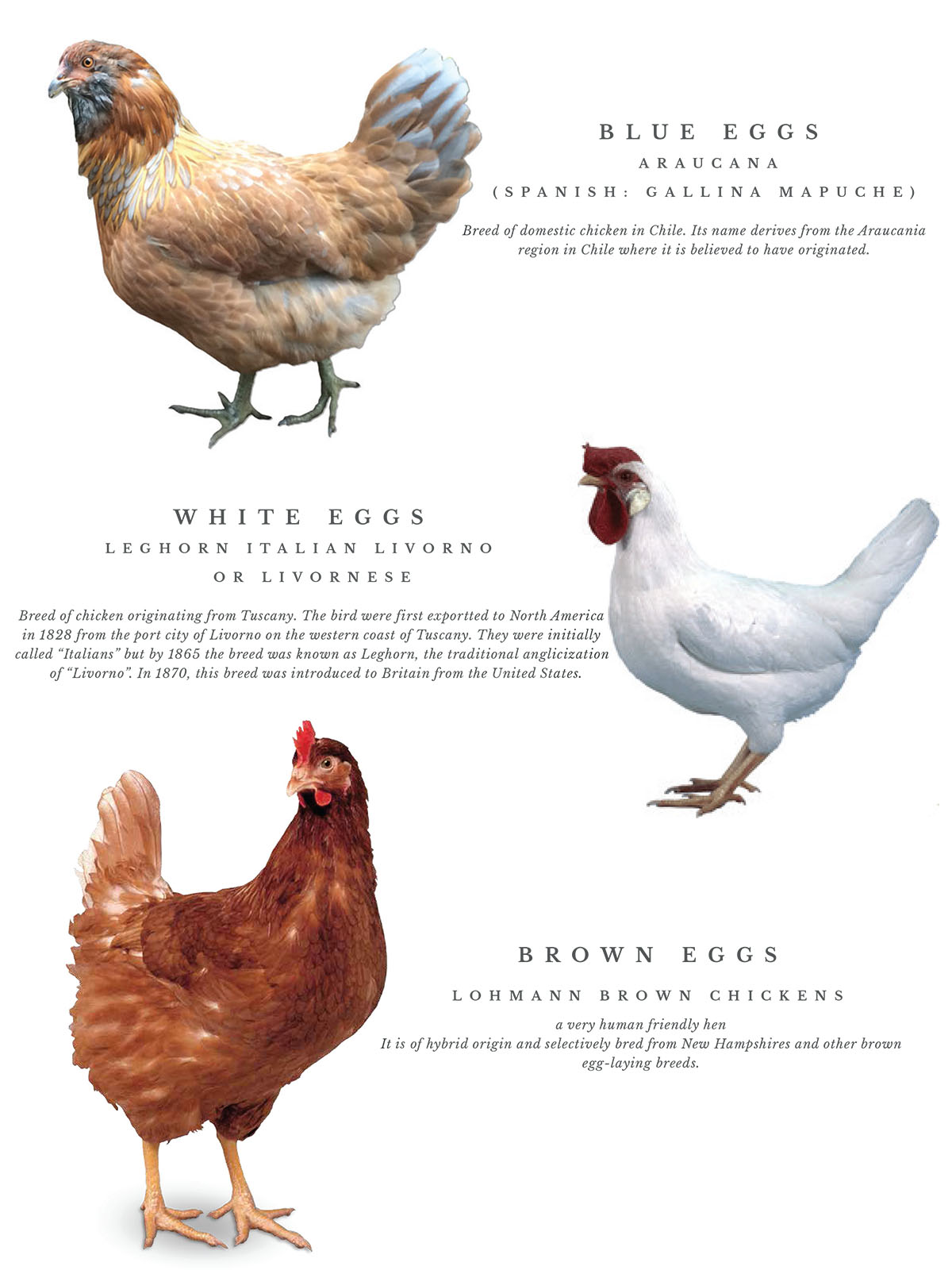

This is so lovely to read.
My chickens were my pets!
Each had own character, hence i went vegetarian 30 yrs ago.I looked at my kaalnek hen with her black and green
Feathers, and made my desision!
hi there, is it possible to purchase hennies from you ?
Hi Julie, unfortunately we do not sell hens.
Good morning. I have a leghorn that lay eggs but recently we decided to scale down a little. My chicken named Betsie needs a good and safe new home. Will you consider having her to help supply eggs for you? I await your response. Thank you. Regards, Mrs Lucie Cronje
Dear Lucie. At the moment we cannot take any Leghorns. We only have Boschvelder & Potch koekoek in the garden.
Very interesting and I would like to have them, but I don’t think my dog would see it as a family companion. How old do chickens get.
Thank you so much for this interesting article.
Kind regards
Dear Gwen, you can train your dog to live and get along with chickens but it takes quite a bit of time, patience and careful supervision. The average age for pet chickens is around 8-10 years.
How do you prevent the hens from destroying your vegetables when you let them out in the gardens? Do you give them access to all of the gardens or only particular areas?
Hi Heather, they will definitely go for the veggies so a low fence should do the trick around your veggie garden. Large stones around the base of more mature plants will also prevent them from scratching too close to the plant
I’d love to do this one day. Just a few questions:
– Is there a way to prevent hen-pecking? (my friends lost half their chickens at the beginning due to some rather severe attacks)
– Is there a way to introduce dogs to their new residents? (I imagine some breeds are a no-no)
– Are there particular plants that would be destroyed by chickens? (i.e. plants that should be kept separate)
– Do chickens eat snails, or is that more of a duck job?
Thanks!
Love your wonderful emails. Love your establishment too. Thank You for always sharing the events at Babylonstoren.
Good day
Love your blog about keeping chickens!
However, is it permitted to keep chickens in a suburban area? I live in Cape Town, Southern Suburbs.
I have also heard that they will “destroy” one’s garden when they scratch in the ground. Is this true?
Regards
Irene
Hi Irene, you can contact your local municipality to find out what the regulations are on keeping chickens because every town has different rules. A low fence should do the trick around your garden. Large stones around the base of more mature plants will also prevent them from scratching too close to the plant.
Thank you for the info.
Please warn home chicken enthusiasts not to feed their chickens white bread, it can accumulate in the crop and sour, causing fatalities.
Thank you for the info Quentin, we will most certainly inform them.
We kept 10 chickens in the 1990s. Great at ferreting grubs from the compost heap. Now we have two daschunds, more lawn :), but no eggs :(.
Simply love getting your blog. Filled with beautiful photography and information. Such a fun blog
Thank you. Happy Memorial weekend
Diana
Thank you Diana! 🙂
Love my chickens and they do make such joyful pets! However mine have stopped laying. Is this a seasonal thing? Or am I not giving them the right meal. They are mostly on the Laying Meal from the Co-op besides running around the garden.
Hi Karen, thank you for your message. There are many factors which can cause hens to stop laying and in many cases there are multiple causes which add up to few or no eggs. The most common causes of decreased egg production include: seasonal changes, improper nutrition, disease, advancing age and stress. We hope this helps to answer your question.
Karen, just remembered, a few years back we had the same problem. Our gardeners introduced the chicken gym. Read about it here.
Most interesting. New things to learn, never ending student of life.
Most interesting. New things to learn, never ending student of life.
Great article. if there is already a family cat, how do chickens generally cope with this? are they able to avoid being attacked and killed. I would hate to get chickens and then find my cat has damaged or killed them. Currently my cat does not kill birds unless they venture into the house through an open door but a chicken might be a different story?
Hi Clare, getting cats and chickens to get along is through the same method as most other domesticated animals – through training, patience and careful supervision.
Thank you for the interesting blog about chickens, fascinating to read about the different types of breeds & their origins, as well as their habitats & daily living. I do love these fascinating animals.
Thank you Alette! They are indeed fascinating.
Hi do you have chickens you would like to give away only looking for 3. If not possible where can I get Some ?
Thanks Ryan
Hi Ryan, unfortunately we do not sell or give away any chickens. At this moment, chickens are very scarce in the country the past few weeks and we unfortunately do not know where you will be able to find some.
Thank you for that article. I found it very informative. I have always wanted to have hens of my own as I do feel there is definitely some therapeutic value in have some. I will definitely be looking into having some of my own.
Thank you so much
Liz
Only a pleasure Liz. Enjoy them!
Thank you for the great article I attended the course and learned so much. I traveled with the 6 eggs to Pretoria and our friends hen did her motherly job… Only one egg hatched, but we are supper exited about it. I will send a picture of Babble – (Our pet name for the chic as she’s form Babylonstoren)
Happy to hear this Cobus, such great news! Thank you for letting us know.
Loved the post and pictures. Very insightful and presented in such a beautiful manner.
Nice articule, it’s a pitty I don’t have a garden for keeping chickens. By the way, can you tell me if there will come a new edition of your Cookbook Babel and if so, when I can order one for export to Europe. That will be very fine. If not, where I can buy on-line the South-African language edition? Thanx very much, Ingrid
Hi Ingrid, unfortunately there will not be a new edition in the cookbook and the Afrikaans one is only available in South Africa. Please email jessica@babylonstoren.com should you have any further questions.
Do you sell chicks? Or any suggestions of where I can buy chicks, please?
Hi Donna, at this moment chickens are very scarce in the country and we unfortunately do not know where you will get hold of some.
Wonderful i have ducks and geese as well. Love tips. Thank you
Thank you Elsje.
Very interesting.
Where can I buy chickens?
Hi Anna, chickens are very scarce in SA at this moment so unfortunately we do not know where you will be find some.
Is dit moontlik om direk met Prof. Ernst van Jaarsveldt in kontak te kom.
Beste Rita
Hy is meestal in die tuin of op ‘n ekspidisie. Jy kan hom kontak by ernst@babylonstoren.com.
Groete